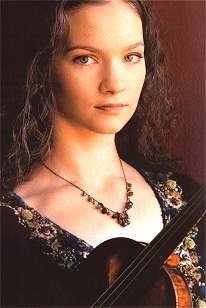Documentaries
about musicians that are made and marketed by their recording
companies can be suspect. This one is more than suspect. It
is boring.
Hilary
Hahn is an exciting young violinist, one of a group of young
fiddlers that seem destined for great things. She has a wonderfully
focused tone, technique to burn and an innate musicality. If
you have heard any of her recordings, you will already know
this. This film will add little if anything to your understanding
of Hahn's art or her influences.
The
cameras follow Hahn on tour to Berlin, Dresden and Hong Kong,
and drop in on a recital rehearsal in Philadelphia and a recording
session in London. Kent Nagano and Sir Colin Davis give brief
testimonials about her artistry. There is an obligatory visit
to the Curtis Institute where she trained, but beyond a couple
of sound bites from Curtis luminary Gary Graffman, this visit
tells us little. The sequence in which Hahn takes the camera
crew for a guided tour of the Curtis Institute feels like padding.
It fills in time, but tells us nothing about the violinist.
Scores of violinists go through Curtis every year. Few go on
to have careers like Hahn's. Viewers want to know what it is
that makes Hahn different. I doubt it has anything to do with
carving the Curtis Halloween pumpkin.
Nor,
it seems, does it have to do with an informed understanding
of the music she plays. Her commentary on Korngold and especially
on Bach sounds incredibly naļve, though there is no doubting
her instinctive understanding of their music. She sounds more
comfortable discussing the practicalities of music performance,
whether in relation to interaction with her audience or the
mechanics of fingering when playing Paganini.
In
a sense it is unfair to expect a documentary of this kind to
be particularly interesting. Hahn is a young trained professional
and has a job as a concert violinist. Why should a short film
about her working life be any more interesting than a documentary
on a young lawyer of her age? She has not in her first couple
of decades experienced the political upheaval that that beset
the great violinists of the past, like Menuhin, Oistrakh and
others.
However,
her life has not been without incident. The makers of this
documentary could have extracted interesting details from her
life or endeavoured to give her story some depth and colour.
After watching this documentary, you will be none the wiser
as to Hahn's family background, or the early influences on her
musical life. Another tantalising prospect left untapped is
hinted at by the opening credits. As the film begins and ends
it is Hahn's performance of Edgar Meyer's violin concerto that
we hear. Meyer wrote the piece for Hahn and she had an important
role in testing the violin part section by section as Meyer
wrote it. Surely this involvement Hahn's part in the creation
of a new violin concerto – and quite a good one as it happens,
in a minimalist-influenced neo-romantic style – is something
of note. Perhaps licensing issues between Sony – Meyer's label
and formerly Hahn's – and Deutsche Grammophon are to blame for
the silence on this subject.
To
sum up, even Hahn's most loyal fans will be disappointed with
this documentary.
Fortunately,
there is a saving grace, in the form of music. Playing music,
after all, is what Hahn does best, and long after you have resolved
never to watch the documentary again, you can return confidently
to this DVD for Hahn's recording of the Korngold violin concerto.
Hahn's performance of this concerto in concert with the Deutsches
Symphonie-Orchester Berlin under Kent Nagano is broken up into
its constituent movements and used to punctuate the documentary,
but luckily someone at Deutsche Grammophon realised that the
DVD's attractions would be enhanced by allowing the concerto
to be played through separately.
Hahn's
performance of the Korngold concerto is committed and reveals
her obvious affection for the piece. As anyone acquainted with
her recording of the Barber concerto on Sony will readily attest,
Hahn's tone and temperament are well suited to bitter-sweet
lyricism, and so it proves again here. I would not choose to
listen to this live concert performance over Perlman's classic
account on EMI or the recent James
Ehnes recording on Onyx, but it is a performance worth hearing
and rehearing nonetheless.
The
DVD also includes a bonus performance of a Mozart sonata, drawn
from a concert given in Munich in 2005, no doubt linked with
Hahn and Zhu's 2004 disc of Mozart sonatas. I have not heard
that disc, but while I cannot say that Hahn's tone is harsh,
as Michael Cookson found in his review,
I agree with him that Hahn's Mozart lacks something in sparkle
and variety of tone. The emphasis here seems to be on beauty
of sound rather than on Mozartian fun.
The
other bonus features are less interesting – a photo gallery,
a promotional video, a list of Hahn's recordings and interview
excerpts that tie in to the Mozart sonata album.
For
Hahn's fans only, then, and – Korngold aside – perhaps not for
all of them.
Tim Perry













